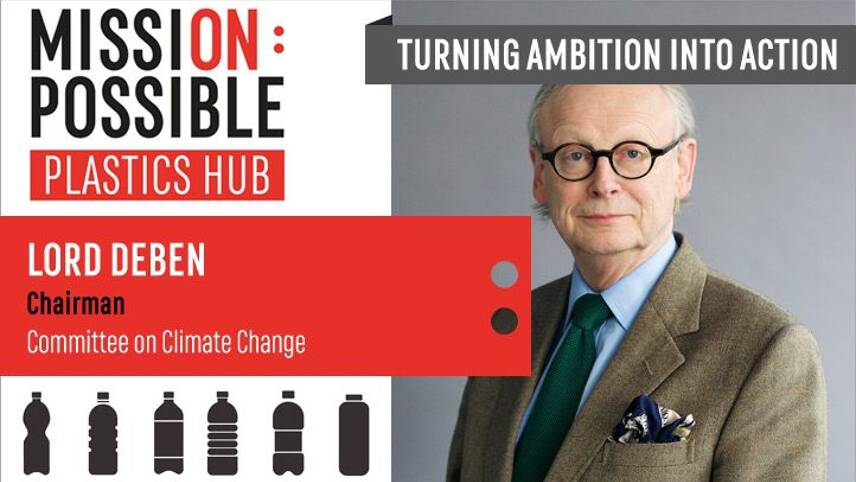Register for free and continue reading
Join our growing army of changemakers and get unlimited access to our premium content

Lord Deben believes that microplastics and other "less visible" plastic pollution by businesses will attract much public scrutiny in 2019
Spurred by the ‘Blue Planet effect’ and new scientific studies laying bare the fact that we are now producing more than double the amount of plastic as we did two decades ago, the UK’s business community has moved at breakneck speed to phase-out single-use items like straws and drinks stirrers in recent times.
And beyond these ‘token’ items, which have become synonymous with ocean pollution, dozens of corporates are now working towards medium-term goals of making all of their packaging recyclable, compostable or reusable – largely under initiatives like WRAP’s UK Plastics Pact and the Ellen MacArthur Foundation’s New Plastics Economy.
But for business action to have a tangible positive impact on the world’s plastic waste problem they now need to move beyond packaging and examine less “visible” plastics in their products and supply chains.
That is according to Lord Deben, who, in addition to his roles at the CCC and in Government, chairs sustainability consultancy Sancroft, giving him a birds-eye view of the UK business community’s sustainability actions to date.
Speaking exclusively to edie, Deben explained that the corporate focus on plastics is about to become “broader”, amid ever-increasing consumer awareness of the issue and policy changes such as the introduction of the new Resources and Waste Strategy (RWS).
“As people see it, the ‘major’ plastics issue concerns packaging, but I think the conversation is about to evolve,” he said. “I do think a more central and wide-reaching approach to this issue is on the horizon – which can only be a good thing.”
“We have already seen some examples of broader plastics action. At Christmas, for example, retailers were selling far fewer plastic-based products, and I’ve seen real evidence concluding that this was a result of people’s desire to avoid plastic items beyond packaging. “
While praising retailers and manufacturers for their efforts to eliminate items like microbeads and plastic-based glitter, Deben noted that several industries with less consumer-facing plastic challenges are still, in his opinion, “lagging behind”.
SHOWCASE YOUR BUSINESS PLASTIC PLEDGE ON THE MISSION POSSIBLE PLASTICS HUB
These include the fashion sector, which produces millions of garments made using plastic-based textile blends – notorious for dispersing plastic microfibres when they are worn or washed – each year.
Such microfibres are, by count, the single largest contributor to watershed plastic pollution in developed countries, with 1.4 million trillion already estimated to have entered oceans and waterways globally.
Policies shake-ups: The key to spurring plastics action?
Horticulture is a further laggard sector, according to Deben, with the vast majority of plants sold in developed nations housed in black plastic that can’t be detected by traditional recycling technologies.
With only businesses within the food and drink and retail sectors having adopted a leadership position on the black plastic problem, Deben is now calling for strict policies to be implemented to spur further corporate action.
“I’m very keen to see institutional action taken that will make it impossible to put things which are not recyclable or cannot be effectively reused on the market, because, at the moment, these items make managing the waste system so much more difficult,” he said.
“As policymakers, we ought to take the actions we can do to change things immediately now. The Extended Producer Responsibility (EPR) system should ensure that businesses using plastic that is not recyclable are made to pay significantly higher costs than those using recyclable materials. It should also make it absolutely clear that businesses cannot use black plastic, which cannot be ‘read’ by recycling technologies and can never be recycled into a product of a different colour.”
Several of these measures – albeit in a less ambitious form – are included in the RWS, which was published in December 2018 after a string of delays. The framework includes proposals for producers to pay full net-costs of all disposal of packaging they place on the market – up from the current rate of 10% – and for this responsibility to be extended to items including vehicle tyres and fishing gear.
It additionally recommends the introduction of increased rates of tax on virgin materials, coupled with tax breaks for manufacturers using recycled content in their products.
Deben, who helped to create the six pillars of the strategy, explained that he was “broadly pleased” with its proposals, but argued that implementation would need to be done in a way which spurred ambitious action without “side-lining” businesses or underplaying their progress to date.
“When we, as businesses or as politicians, are facilitating these conversations, it is important that we do not get depressed,” he said.
“It is rather easy to think about the bad things and, although there are lots of them and they are sizeable, we should remind ourselves of our successes so far. This is the only thing that drives us forward to reap more success.”
Taking place on Thursday: edie’s single-use plastics business transformation webinar
Sustainability professionals seeking more insight on how best to reducing or eliminate single-use plastics can tune in to edie’s free webinar, entitled ‘Single-use plastics: How to lead a business transformation’, on Thursday (17 January) at 2pm.
Featuring expert speakers from A Plastic Planet, Sky and Cranswick, the hour-long session will combine best-practice case studies with expert insights to give you a clear way forward in your organisation’s approach to plastics.
— REGISTER FOR THE WEBINAR HERE —
Sarah George


Please login or Register to leave a comment.